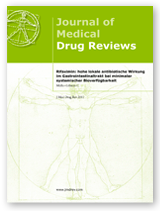
Das Journal of Medical Drug Reviews ist ein "Open Access"-Journal. Alle Artikel können für die persönliche Information des einzelnen Nutzers kostenlos heruntergeladen werden. Hingegen ist für eine kommerzielle Nutzung der Inhalte dieses Journals in jedwedem Medium die schriftliche Genehmigung des Verlages zwingend erforderlich. Das Urheberrecht liegt ausschließlich beim Verlag Reprint Publications GmbH & Co. KG.
© Reprint Publications 2016,
Webdesign Bothgrafik,
Programmierung amr
Inhibition of mTOR with everolimus for the treatment of advanced renal cell carcinoma after failure of anti-VEGF therapy
J Med Drug Rev 2012;2;19-30ABSTRACT (Review-Artikel in deutscher Sprache)
Molecularly targeted therapies have widened considerably the spectrum of medically treatment options for the advanced renal cell carcinoma (RCC). Additionally to cytokines, several anti-VEGF (vascular endothelial growth factor) therapies and inhibitors of the mTOR (mammalian target of rapamycin) pathway are available. In the RECORD-I study, 416 patients were stratified according to prognostic criteria and the number of previous TKI treatments and randomised to everolimus therapy + BSC (best supportive care) (n=277) or placebo + BSC (n=139). Everolimus significantly improved the median progression-free survival (PFS) from 1.9 months (placebo) to 4.9 months (hazard ratio [HR] =0.33, 95 % CI 0.25-0.43; p<0.001).
Subgroup analyses demonstrated a consistent, and statistically significant PFS-prolonging effect of everolimus after one or two previous TKI treatments (HR 0.32 each; p<0.001), after TKI intolerance (HR 0.32; p=0.004) as well as after bevacizumab pre-treatment (HR 0.30; p=0.001). Treatment effect was better in patients with good risk scores as in patients with poor scores. The median overall survival was 14.8 months in the everolimus-arm compared with 14.4 months in the placebo-arm; however 80 % of placebo-patients switched to everolimus. In the everolimus group, the Karnofsky performance status remained significantly longer stable after treatment start than in the placebo group, whereas nearly no relevant changes during study course (until tumour progress) were perceptible in both study-arms according to several patients self-assessment tools.
Everolimus was well tolerated by most patients. Most frequently observed clinically relevant adverse effects were stomatitis, infections, diarrhoea, rash, peripheral oedema, and non-infectious Pneumonitis. The last one is a class-effect of inhibitors of mTOR and was observed in 14% of patients (4% grad 3, no grad 4).
Due to the results of this phase III trial, the inhibitor of mTOR everolimus was licensed for the treatment of metastatic RCC after failure of anti-VEGF treatment in the United States and in Europe and is now recommended for this indication by the treatment guidelines of several international oncologic societies with the highest evidence level.

